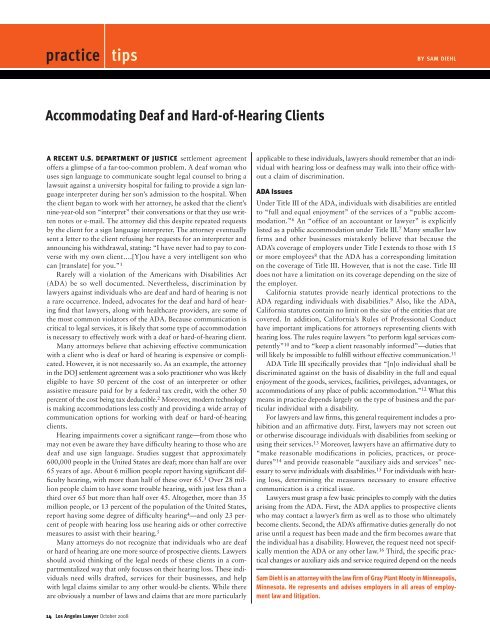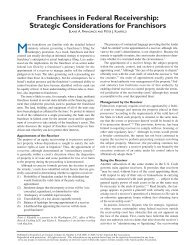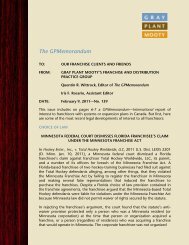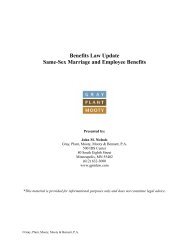Los Angeles Lawyer October 2008 - Gray Plant Mooty
Los Angeles Lawyer October 2008 - Gray Plant Mooty
Los Angeles Lawyer October 2008 - Gray Plant Mooty
Create successful ePaper yourself
Turn your PDF publications into a flip-book with our unique Google optimized e-Paper software.
practice tips<br />
BY SAM DIEHL<br />
Accommodating Deaf and Hard-of-Hearing Clients<br />
A RECENT U.S. DEPARTMENT OF JUSTICE settlement agreement<br />
offers a glimpse of a far-too-common problem. A deaf woman who<br />
uses sign language to communicate sought legal counsel to bring a<br />
lawsuit against a university hospital for failing to provide a sign language<br />
interpreter during her son’s admission to the hospital. When<br />
the client began to work with her attorney, he asked that the client’s<br />
nine-year-old son “interpret” their conversations or that they use written<br />
notes or e-mail. The attorney did this despite repeated requests<br />
by the client for a sign language interpreter. The attorney eventually<br />
sent a letter to the client refusing her requests for an interpreter and<br />
announcing his withdrawal, stating: “I have never had to pay to converse<br />
with my own client….[Y]ou have a very intelligent son who<br />
can [translate] for you.” 1<br />
Rarely will a violation of the Americans with Disabilities Act<br />
(ADA) be so well documented. Nevertheless, discrimination by<br />
lawyers against individuals who are deaf and hard of hearing is not<br />
a rare occurrence. Indeed, advocates for the deaf and hard of hearing<br />
find that lawyers, along with healthcare providers, are some of<br />
the most common violators of the ADA. Because communication is<br />
critical to legal services, it is likely that some type of accommodation<br />
is necessary to effectively work with a deaf or hard-of-hearing client.<br />
Many attorneys believe that achieving effective communication<br />
with a client who is deaf or hard of hearing is expensive or complicated.<br />
However, it is not necessarily so. As an example, the attorney<br />
in the DOJ settlement agreement was a solo practitioner who was likely<br />
eligible to have 50 percent of the cost of an interpreter or other<br />
assistive measure paid for by a federal tax credit, with the other 50<br />
percent of the cost being tax deductible. 2 Moreover, modern technology<br />
is making accommodations less costly and providing a wide array of<br />
communication options for working with deaf or hard-of-hearing<br />
clients.<br />
Hearing impairments cover a significant range—from those who<br />
may not even be aware they have difficulty hearing to those who are<br />
deaf and use sign language. Studies suggest that approximately<br />
600,000 people in the United States are deaf; more than half are over<br />
65 years of age. About 6 million people report having significant difficulty<br />
hearing, with more than half of these over 65. 3 Over 28 million<br />
people claim to have some trouble hearing, with just less than a<br />
third over 65 but more than half over 45. Altogether, more than 35<br />
million people, or 13 percent of the population of the United States,<br />
report having some degree of difficulty hearing 4 —and only 23 percent<br />
of people with hearing loss use hearing aids or other corrective<br />
measures to assist with their hearing. 5<br />
Many attorneys do not recognize that individuals who are deaf<br />
or hard of hearing are one more source of prospective clients. <strong>Lawyer</strong>s<br />
should avoid thinking of the legal needs of these clients in a compartmentalized<br />
way that only focuses on their hearing loss. These individuals<br />
need wills drafted, services for their businesses, and help<br />
with legal claims similar to any other would-be clients. While there<br />
are obviously a number of laws and claims that are more particularly<br />
applicable to these individuals, lawyers should remember that an individual<br />
with hearing loss or deafness may walk into their office without<br />
a claim of discrimination.<br />
ADA Issues<br />
Under Title III of the ADA, individuals with disabilities are entitled<br />
to “full and equal enjoyment” of the services of a “public accommodation.”<br />
6 An “office of an accountant or lawyer” is explicitly<br />
listed as a public accommodation under Title III. 7 Many smaller law<br />
firms and other businesses mistakenly believe that because the<br />
ADA’s coverage of employers under Title I extends to those with 15<br />
or more employees 8 that the ADA has a corresponding limitation<br />
on the coverage of Title III. However, that is not the case. Title III<br />
does not have a limitation on its coverage depending on the size of<br />
the employer.<br />
California statutes provide nearly identical protections to the<br />
ADA regarding individuals with disabilities. 9 Also, like the ADA,<br />
California statutes contain no limit on the size of the entities that are<br />
covered. In addition, California’s Rules of Professional Conduct<br />
have important implications for attorneys representing clients with<br />
hearing loss. The rules require lawyers “to perform legal services competently”<br />
10 and to “keep a client reasonably informed”—duties that<br />
will likely be impossible to fulfill without effective communication. 11<br />
ADA Title III specifically provides that “[n]o individual shall be<br />
discriminated against on the basis of disability in the full and equal<br />
enjoyment of the goods, services, facilities, privileges, advantages, or<br />
accommodations of any place of public accommodation.” 12 What this<br />
means in practice depends largely on the type of business and the particular<br />
individual with a disability.<br />
For lawyers and law firms, this general requirement includes a prohibition<br />
and an affirmative duty. First, lawyers may not screen out<br />
or otherwise discourage individuals with disabilities from seeking or<br />
using their services. 13 Moreover, lawyers have an affirmative duty to<br />
“make reasonable modifications in policies, practices, or procedures”<br />
14 and provide reasonable “auxiliary aids and services” necessary<br />
to serve individuals with disabilities. 15 For individuals with hearing<br />
loss, determining the measures necessary to ensure effective<br />
communication is a critical issue.<br />
<strong>Lawyer</strong>s must grasp a few basic principles to comply with the duties<br />
arising from the ADA. First, the ADA applies to prospective clients<br />
who may contact a lawyer’s firm as well as to those who ultimately<br />
become clients. Second, the ADA’s affirmative duties generally do not<br />
arise until a request has been made and the firm becomes aware that<br />
the individual has a disability. However, the request need not specifically<br />
mention the ADA or any other law. 16 Third, the specific practical<br />
changes or auxiliary aids and service required depend on the needs<br />
Sam Diehl is an attorney with the law firm of <strong>Gray</strong> <strong>Plant</strong> <strong>Mooty</strong> in Minneapolis,<br />
Minnesota. He represents and advises employers in all areas of employment<br />
law and litigation.<br />
14 <strong>Los</strong> <strong>Angeles</strong> <strong>Lawyer</strong> <strong>October</strong> <strong>2008</strong>







